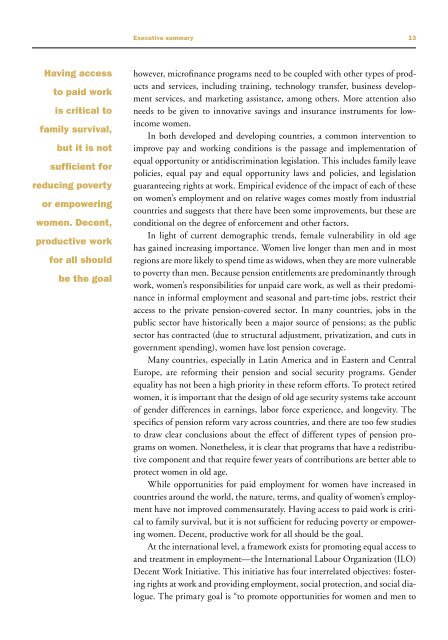Taking action: achieving gender equality and empowering women
Taking action: achieving gender equality and empowering women
Taking action: achieving gender equality and empowering women
You also want an ePaper? Increase the reach of your titles
YUMPU automatically turns print PDFs into web optimized ePapers that Google loves.
Executive summary<br />
13<br />
Having access<br />
to paid work<br />
is critical to<br />
family survival,<br />
but it is not<br />
sufficient for<br />
reducing poverty<br />
or <strong>empowering</strong><br />
<strong>women</strong>. Decent,<br />
productive work<br />
for all should<br />
be the goal<br />
however, microfinance programs need to be coupled with other types of products<br />
<strong>and</strong> services, including training, technology transfer, business development<br />
services, <strong>and</strong> marketing assistance, among others. More attention also<br />
needs to be given to innovative savings <strong>and</strong> insurance instruments for lowincome<br />
<strong>women</strong>.<br />
In both developed <strong>and</strong> developing countries, a common intervention to<br />
improve pay <strong>and</strong> working conditions is the passage <strong>and</strong> implementation of<br />
equal opportunity or antidiscrimination legislation. This includes family leave<br />
policies, equal pay <strong>and</strong> equal opportunity laws <strong>and</strong> policies, <strong>and</strong> legislation<br />
guaranteeing rights at work. Empirical evidence of the impact of each of these<br />
on <strong>women</strong>’s employment <strong>and</strong> on relative wages comes mostly from industrial<br />
countries <strong>and</strong> suggests that there have been some improvements, but these are<br />
conditional on the degree of enforcement <strong>and</strong> other factors.<br />
In light of current demographic trends, female vulnerability in old age<br />
has gained increasing importance. Women live longer than men <strong>and</strong> in most<br />
regions are more likely to spend time as widows, when they are more vulnerable<br />
to poverty than men. Because pension entitlements are predominantly through<br />
work, <strong>women</strong>’s responsibilities for unpaid care work, as well as their predominance<br />
in informal employment <strong>and</strong> seasonal <strong>and</strong> part-time jobs, restrict their<br />
access to the private pension-covered sector. In many countries, jobs in the<br />
public sector have historically been a major source of pensions; as the public<br />
sector has contracted (due to structural adjustment, privatization, <strong>and</strong> cuts in<br />
government spending), <strong>women</strong> have lost pension coverage.<br />
Many countries, especially in Latin America <strong>and</strong> in Eastern <strong>and</strong> Central<br />
Europe, are reforming their pension <strong>and</strong> social security programs. Gender<br />
<strong>equality</strong> has not been a high priority in these reform efforts. To protect retired<br />
<strong>women</strong>, it is important that the design of old age security systems take account<br />
of <strong>gender</strong> differences in earnings, labor force experience, <strong>and</strong> longevity. The<br />
specifics of pension reform vary across countries, <strong>and</strong> there are too few studies<br />
to draw clear conclusions about the effect of different types of pension programs<br />
on <strong>women</strong>. Nonetheless, it is clear that programs that have a redistributive<br />
component <strong>and</strong> that require fewer years of contributions are better able to<br />
protect <strong>women</strong> in old age.<br />
While opportunities for paid employment for <strong>women</strong> have increased in<br />
countries around the world, the nature, terms, <strong>and</strong> quality of <strong>women</strong>’s employment<br />
have not improved commensurately. Having access to paid work is critical<br />
to family survival, but it is not sufficient for reducing poverty or <strong>empowering</strong><br />
<strong>women</strong>. Decent, productive work for all should be the goal.<br />
At the international level, a framework exists for promoting equal access to<br />
<strong>and</strong> treatment in employment—the International Labour Organization (ILO)<br />
Decent Work Initiative. This initiative has four interrelated objectives: fostering<br />
rights at work <strong>and</strong> providing employment, social protection, <strong>and</strong> social dialogue.<br />
The primary goal is “to promote opportunities for <strong>women</strong> <strong>and</strong> men to

















